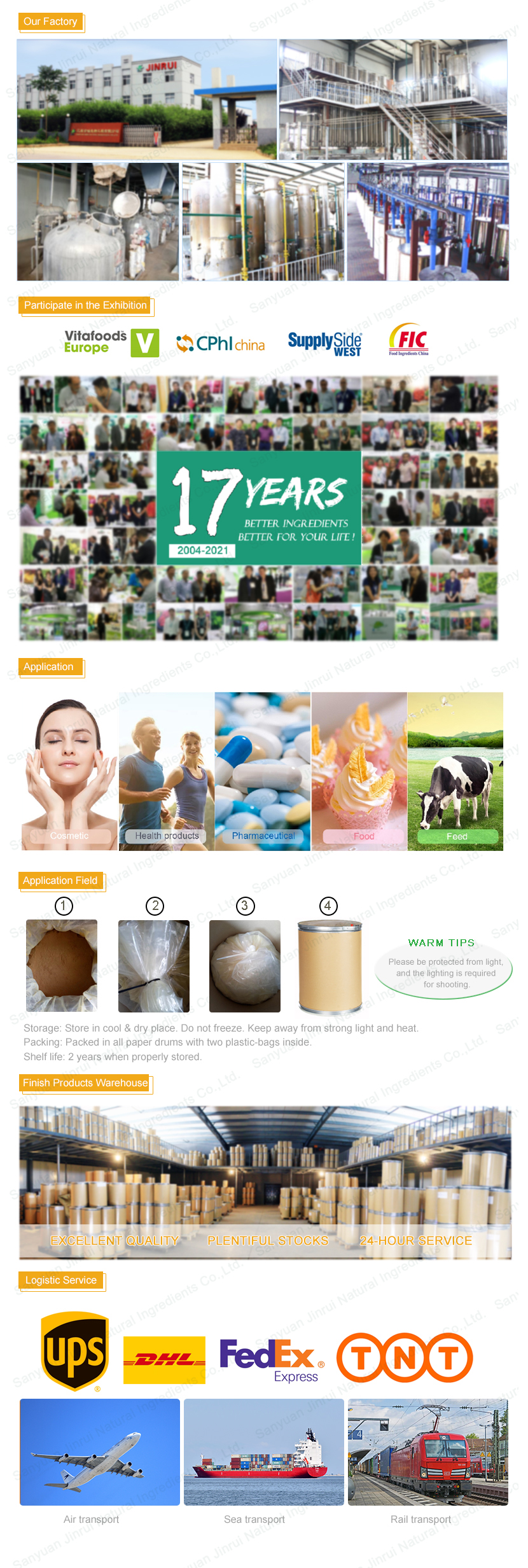|
Sanyuan Jinrui Natural Ingredients Co.,Ltd.
|
Product Code: JRG-S-004
English Name: Tomato Extract
Latin Name: Lycopersicon esculentum Mill.
Used Part: Fruit
Active ingredient: Lycopene
Specification: Lycopene ≥5.0%
Test Method: By HPLC
Appearance: Fine deep red powder
1. Introduction
Tomato Extract is extracted and refined from natural plant tomato. Its active ingredient is lycopene, dark red powder. Tomato extract, also known as Lycopene, is a carotenoid and belongs to the same family as β-carotene.
According to the latest scientific research, tomato extract is not only the basic nutrient component of the human body, but also has its unique pharmacological effects in increasing the body's immune function, inhibiting mutagenesis, and anti-oxidation. It has a miraculous effect on the prevention and treatment of prostate disease, prostate cancer, lung cancer, stomach cancer, and breast cancer. It effectively inhibits the spread and replication of cancer cells. It is called "plant gold" by Western countries.
2. Plant source
Tomato (scientific name: Lycopersicon esculentum) is an annual herbaceous plant of the Solanaceae family, with a body height of 0.6 to 2 meters. The whole body has viscous glandular hairs. It has a strong smell and the stem is easy to fall. The berries are oblate or nearly spherical, fleshy and juicy, orange or bright red, smooth; seeds are yellow. Flower and fruit period in summer and autumn. Tomato is one of the most commonly cultivated fruits and vegetables in the world. It can be eaten raw, cooked, processed tomato sauce, juice or canned whole fruit.
3. Specification
| English Name |
Tomato Extract |
| Latin Name |
Lycopersicon esculentum Mill. |
| Specification |
Lycopene ≥ 5.0% |
| Appearance |
Fine deep red powder |
| Odor |
Characteristic |
| Taste |
Characteristic |
| Bulk density |
40-60g/100ml |
| Tapped density |
60-90g/100ml |
| Particle size |
NLT 100% pass 80 mesh |
| Loss on drying |
≤ 5.00% |
| Residue on Ignition |
≤ 5.00% |
| Pesticides residue |
Complies |
| Heavy Metals |
| Total Heavy Metals |
≤10ppm |
| Lead |
≤3ppm |
| Arsenic |
≤1ppm |
| Mercury |
≤0.1ppm |
| Cadmium |
≤1ppm |
| Microbiology |
| Total plate count |
≤ 1000cfu/g |
| Yeast & Mould count |
≤ 100cfu/g |
| Enterobacteriaceae (BTGN) |
≤ 100cfu/g |
| Escherichia coli |
Not Detected/g |
| Salmonella species |
Not Detected/10g |
| Staphylococcus aureus |
Not Detected/g |
4. Function
1. Tomato Extract has a strong antioxidant effect. It achieves its physiological activity by protecting the body's cells from oxidative damage. The antioxidant effect of lycopene is 3 times that of beta carotene and 100 times that of vitamin E.
2. Has the effect of regulating blood lipids.
3. Anti-aging, lycopene is far better than other carotenoids and vitamin E in scavenging free radicals.
4. Anti-radiation, prevent skin from being damaged by ultraviolet rays.
5. Protect the cardiovascular system and prevent heart disease.
6. Lycopene can help prevent and improve prostate hyperplasia, prostatitis and other urinary system diseases, and help improve the quality of male sperm and reduce the risk of infertility.
5. Application
Tomato Extract is commonly used in the fields of food, health products, cosmetics and medicine.
 |
Send Inquiry
|
|
Hunan Sunfull Bio-tech Co., Ltd
|
Botanical Resource:. Lycopersicon esculentum Mill
Part of the Plant Used: Fruit
Active Ingredients: lycopene
Molecular formula: C40H56
Molecular weight: 536.88
CAS No.: 502-65-8
EC No.: 207-949-1
Molecular Structure:
Appearance & Color: Deep red solid powder or oil
Solubility: Lycopene is insoluble in water, and can be dissolved only in organic solvents and oils.
Product Specification: 5%, 6%, 10%, 98% lycopene
Product Introduction
Lycopene is a kind of carotene, as a powerful antioxidant abundant in red tomatoes and processed tomato products. It is the elemental nutriment in human body with good physiological effect. Lycopene may help prevent prostate cancer and some other forms of cancer, heart disease, and other serious diseases. Ongoing preliminary research suggests that lycopene is associated with reduced risk of macular degenerative disease, serum lipid oxidation and cancers of the lung, bladder, cervix and skin. Studies are underway to investigate other potential benefits of lycopene - including the H.J. Heinz Company sponsored research at the University of Toronto and at the American Health Foundation. These studies will focus on lycopene's possible role in the fight against cancers of the digestive tract, breast and prostate cancer.
Applications
● Pharmaceutical stuff
● Functional food and food additive
|
Send Inquiry
|





 Pharma Sources Insight July 2025
Pharma Sources Insight July 2025


